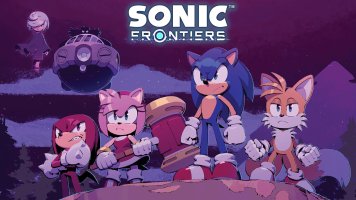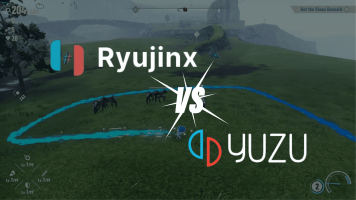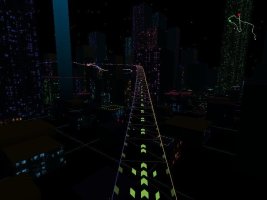It doesn't matter who they are, or what the main topic of discussion is. Even if they're in a non-creative field, like an accountant or marketing. At the end, make a point of throwing this question out there and seeing what happens. Your author has been doing interviews for 20 years, and no one has ever claimed not to have seen one.
This is vitally important. If an unreleased game was previewed, we at least know it existed and have clues to pursue it. For example, we know about the SNES shmup Christopher Columbus thanks to magazine coverage, and that it was by Misawa Entertainment. Now, if anyone mentions they worked for or with that company, interviewers can ask about that specific lost media.
But if a game was never revealed to the public, no one knows to ask about it, and anyone involved is unlikely to mention it unless prompted. According to Slashdata, there are 11 million game developers in the world. Even accounting for the fact a single game now has teams of hundreds, it's a safe bet that every single person knows of at least one unreleased title, putting the likely number in the thousands.
Case in point: my interview with Justin Garvanovic, which is included below. He had been a programmer for Probe in Croydon, and had ported Terminator 2: The Arcade Game to the SNES. There was no team, as he explained; just him working on his own, and then the QA department testing it. The crux of the interview was regarding Nintendo's Super Scope peripheral and the challenges this presented. Garvanovic humorously and sarcastically stated that "the testers loved me" – given how much testing was required, with a controller, mouse, and Super Scope.
1988's Advanced Dungeons & Dragons: Heroes of the Lance fused the popular tabletop RPG with a side-scrolling action adventure format. Could Hudson's SNES title have adopted a similar approach? We'll sadly never know...
Towards the end, we did our usual thing of asking about unreleased games. His replies were pure gold, which we present below. The following is an excerpt from The Untold History of Game Developers Volume 5 – if you enjoy it, please consider taking a look at the rest of the book.
I'd love to interview you at length about your career - more than just the Super Scope stuff.
Justin Garvanovic: Oh, I'm sure there are plenty of other devs out there. It was a fun time; I lost interest when the "team stuff" came along. It was fun working with a musician and graphics person, and that was it. I am a pack rat, so I have all my old source code. Sadly I don't have the original arcade stuff - they sent the graphics.
JS: Did you ever work on games that went unreleased?
JG: After T2 I did the intro code on a Japanese football game. Forget the name. <short pause...> J-League Super Soccer. I just looked, again, the code is all here. I then started work on a D&D game on the SNES, with rotoscoped graphics, think Castlevania-ish, for Hudson Soft, I believe. But the PS1 was on the horizon, so it was only a few months old before it was canned. And then I moved onto PS1.
JS: This D&D game sounds fascinating. What percentage was complete? Was it ever previewed? Or is it totally unknown?
JG: Guy walking around, climbing, jumping, just getting the engine done. It could do all sorts of fun stuff like split modes down the screen, so you could have a Mode 7 section in the middle third, with normal stuff above and below it. I also updated the entire screen every frame, instead of just the edge when it scrolled, this allowed full screen background animation.
It would have been nice, but would have taken a good 18 months, by which time the SNES would have been "dead". No previews - it was just too early.
JS: This is news! Please do not lose any of the work you've done on it. Do you have any working assets? Like a compiled ROM?
Capcom's Dungeons & Dragons arcade titles were based on the company's side-scrolling fighting games, and showed how the license could be used in unique ways
JG: I have no ROM of it - sadly.
JS: Just raw code?
JG: Yep.
JS: I feel we've just unearthed a forgotten piece of treasure.
JG: You really haven't. I am sure there are plenty of games that got further that also got canned at around this time. Every new generation creates a lot of excitement for what they'll bring, but of course, games everywhere were being canned because of a new generation coming. I guess with the current generations being so similar, it happens less nowadays.
JS: I know of two different researchers who wrote books on unreleased games. Frank Gasking and Games That Weren't, and Luca Taborelli with Video Games You Will Never Play. It's a hot topic.
JG: I can see that - but these are a long way from being games - they are early "proof" of being possible things, more than early games. They are a long way from being a game. And as I said, I feel certain there are a LOT of these around. I also started Frak! on the Amiga, and it never came out, either. I think someone covered that one already though, in an interview with Nick Pelling.
JS: Even if a game never got far, the potential sets one's imagination alight. It's fun to think about. It's up to you - I only ask that you continue to hang on to stuff.
JG: Indeed it is fun, but I think there should be a clear distinction between something that was playable, and something that was more of a tech demo. I will not be getting rid of it.
JS: Thank you. Then my mind is at ease. A lot of companies are like: "Yeah, we just threw everything in a skip afterwards."
JG: I know, that annoys me - I wish I'd kept more TVs. I love my retro games, but I have one good TV left here - the one I developed on! - but a few more would have been nice. We just never thought back then. If we did, we'd have kept all those games in their wrapping, and put them in the loft.
This discussion raises numerous fascinating points to dive into. Firstly, Garvanovic isn't properly credited in J-League Super Soccer - he's listed simply as "Justin G". (It was published by Hudson Soft in March 1994.)
More significant is Hudson's pursuit of the D&D license. The earliest official D&D iterations started in 1981 and 1982, with an LCD game and two titles for the Intellivision. From there, the history becomes ridiculously convoluted, and we're not even pretending we can disentangle it. A Side-scrolling D&D game arrived in 1998 in the form of Advanced Dungeons & Dragons: Heroes of the Lance, which could be seen as conceptually similar to what Garvanovic describes.
But, things got interesting when Japanese developer Capcom released Dungeons & Dragons: Tower of Doom for arcades in 1994 and Dungeons & Dragons: Shadow over Mystara in 1996, also for arcades. Showing that Japanese companies had access to the license from then-owners TSR.
Hudson meanwhile had published officially licensed adaptations of The Record of Lodoss War on PC Engine CD-ROM in 1992, and its PCE-CD sequel in 1994. Super Famicom and Mega CD games based on Lodoss War were handled by other publishers. For those who have never heard of it, Lodoss War was Japan's own home-grown attempt at Tolkien-style fantasy.
D&D has become a very hot property in recent years, with games like Baldur's Gate 3 bringing it to a whole new audience
This is pure speculation on our part, but if Lodoss War sold well enough for Hudson to publish a sequel, and versions of it on other systems were licensed to other publishers, while Capcom was also seeing success with D&D in arcades, it seems like a feasible scenario that Hudson might pursue a D&D game for the SNES. Perhaps for a Japanese audience, perhaps for outside Japan. Lodoss War and D&D are thematically similar, after all.
Garvanovic couldn't comment on the licensing arrangement. TSR, meanwhile, the previous license holders of D&D, were bought by Wizards of the Coast in 1997. We emailed Wizards twice, hoping that someone might have information on dealings pre-1997, but received no reply.
There's still so much more to discover with this mystery. Garvanovic's code still exists somewhere in his archives. We also now know to ask Hudson staff about it in any future interviews; likewise Capcom or TSR / Wizards of the Coast staff, to get a better idea of how the license was handled. Also, any colleagues of Garvanovic's from Probe, since the company also developed the soccer game which was published by Hudson.
So many avenues of enquiry are now open, on something no one had any idea even existed, and all thanks to one question at the end of an interview.
Please, always ask about unreleased games.





